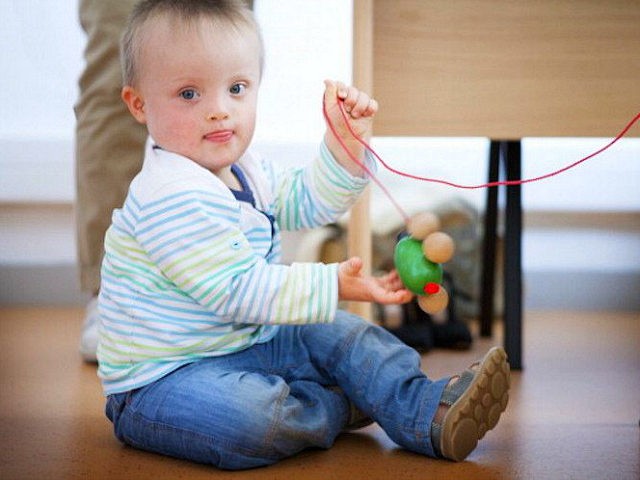A disturbing new report from CBS News reveals that nearly 100 percent of pregnant women in Iceland whose babies test positive for Down Syndrome wind up aborting their children.
“My understanding is that we have basically eradicated, almost, Down syndrome from our society—that there is hardly ever a child with Down syndrome in Iceland anymore,” said Kari Stefansson, a geneticist and the founder of deCODE Genetics, a company that has studied nearly the entire Icelandic population’s genomes.
Hulda Hjartardottir, the head of the Prenatal Diagnosis Unit at Landspitali University Hospital, where around 70 percent of Icelandic children are born, offered an eerie explanation of how a few Down syndrome babies slipped through the nets of prenatal screening and were born despite the best efforts to the contrary.
“Some of them were low risk in our screening test, so we didn’t find them in our screening,” she said.
Iceland is on pace to virtually eliminate Down syndrome through abortion. #CBSNOA learns more, tonight at 10pm ET/PT https://t.co/EB6BKgQFN3 pic.twitter.com/SOKU7oe6a3
— CBS News (@CBSNews) August 15, 2017
Prenatal screening tests were introduced in Iceland in the early 2000s, and by law, all expectant mothers must be informed about the availability of prenatal testing. While the tests do not actually detect Down syndrome in unborn babies, they do indicate the likelihood of chromosome abnormality, and almost all Icelandic women abort once they receive a positive outcome from the test.
Since Down syndrome cannot be cured or prevented, the only way to eradicate the condition is by eliminating any child that might have it before they are born.
“We don’t look at abortion as a murder,” said Helga Sol Olafsdottir, who counsels women who have a pregnancy with a chromosomal abnormality at Landspitali University Hospital. “We look at it as a thing that we ended.”
Olafsdottir tells women who are wrestling with the decision whether or not to abort their child or feelings of guilt after doing so: “This is your life — you have the right to choose how your life will look like.”
CBS reported that the abortion rates for babies suspected of having Down syndrome are high almost everywhere, though nowhere as high as Iceland. In the United States, about 67 percent of fetuses with Down syndrome are aborted; in France, it is around 77 percent; and in Denmark, a stunning 98 percent of Down children are killed before birth.
The handful of children born with Down syndrome in Iceland—an average of just one or two a year—are often the result of “inaccurate test results,” CBS reported.
One such case was that of Thordis Ingadottir, who took the screening test when she was pregnant with her third child at the age of 40. The results suggested that it was highly improbable that her child had Down syndrome (chances of 1 in 1,600), so she went ahead with the pregnancy.
Ingadottir’s daughter Agusta, who is now 7, was born in 2009 with Down syndrome. Despite the circumstances surrounding her pregnancy, since the birth of her daughter, Ingadottir has become an activist for the rights of people with Down syndrome.
I hope that Agusta “will be fully integrated on her own terms in this society. That’s my dream,” Ingadottir said. “Isn’t that the basic needs of life? What kind of society do you want to live in?”
Iceland’s 100 percent termination rate “reflects a relatively heavy-handed genetic counseling,” Kari Stefansson said. “And I don’t think that heavy-handed genetic counseling is desirable.”
“You’re having impact on decisions that are not medical, in a way,” he said.
Last year, a popular BBC documentary questioned the rationale behind a controversial new pregnancy screening program for the UK that indicates the presence of Down syndrome in unborn babies.
Titled “A World Without Down Syndrome?” the documentary was hosted by English actress Sally Philips, whose 11-year-old son, Olly, is a Down child.
“In the last ten years, the number of people terminating for Down syndrome has gone up by 40 percent,” Phillips noted. “Now nine out of ten British women terminate when they receive a positive diagnosis.”
The result is that only 40,000 people with Down syndrome are left in the UK.
“What’s so very dreadful to the world about Down syndrome?” Phillips asked, noting how her own life was improved by the birth of her son, despite what doctors had told her.
“I expected tragedy and got comedy,” Phillips said, adding that “a majority of people with a Down syndrome family member are really happy with their lot.”
According to the actress, the question comes down to: “What sort of world do we want to live in and who do we want in it?”
Follow Thomas D. Williams on Twitter Follow @tdwilliamsrome.

COMMENTS
Please let us know if you're having issues with commenting.